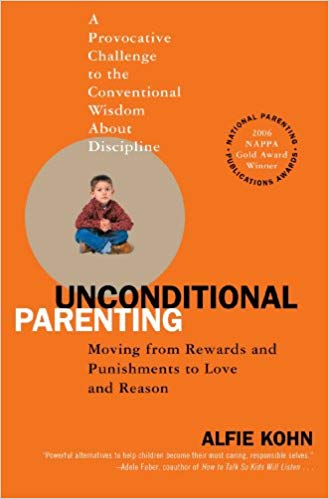What do you think?
Rate this book


272 pages, Kindle Edition
First published January 1, 2005
ŌĆ£How we feel about our kids isn't as important as how they experience those feelings and how they regard the way we treat them.ŌĆ�You can keep telling yourself (and them) that you love them and youŌĆÖre doing it for their better interests but actions speak louder than words and itŌĆÖs up to the person to decide who they trust, respect and believe!
Rewards and punishments turn childrenŌĆÖs attention onto themselves; ŌĆśwhat will happen to me if I (share, hit him, say thank you etc)ŌĆ� rather than ŌĆśwhat will happen to him and how will he feel if I (you get the point)ŌĆ�This was something that Alfie put into words so well. Read the book just for this point (I donŌĆÖt have specific quotes but itŌĆÖs a recurring theme). What kind of people do you look up to, want to know and be friends with? People who are considerate, kind and look out for you or people who only do stuff for you if there is something in it for them.
Discussion rather than punishment.Telling a child to go to their room after they hit someone isnŌĆÖt going to magically make them realise that they hurt another person especially if theyŌĆÖre very young when this event occurs. By discussing what happened you can help children to learn that their actions do have consequences but that those consequences are not going to their room or getting grounded, they are that other people will be affected, they may get hurt and upset etc.
No one is perfect. Please donŌĆÖt pretend to be because of your children.Your job as a parent is to help your children to learn, discover and explore the world. Show them that people do make mistakes, they are sad sometimes, nobody knows everything and everyone needs help some of the time. If a child sees everyone else as perfect but knows that they are not, what will the repercussions be to their self-confidence, self-love, self-worth and the way they view the world. Think resentment, regret, hatred etc. ItŌĆÖs not good basically.
ŌĆ£People who can ŌĆōand do- think about how others experience the world are more likely to reach out and help those people-or, at a minimum, are less likely to harm them.ŌĆ�Perspective. Try and see the world from the childŌĆÖs point of view. Show them how to think about other people and realise they have feelings and thoughts too and are the centre of their universe just like you're the centre of yours. After talking a little about how war is a ŌĆ£monstrous failure of imaginationŌĆ� Alfie then goes on to say ŌĆ£Less dramatically, many of the social problems we encounter on a daily basis can be understood as a failure of perspective taking. [ŌĆ”] To work on seeing things as others see them is to live a very different sort of life.ŌĆ�